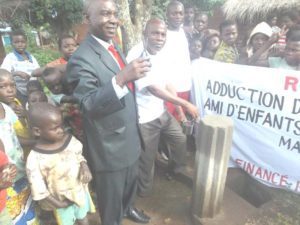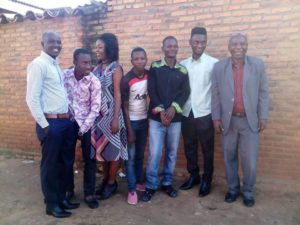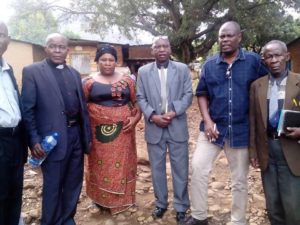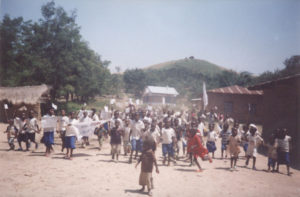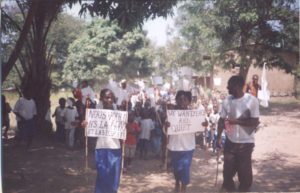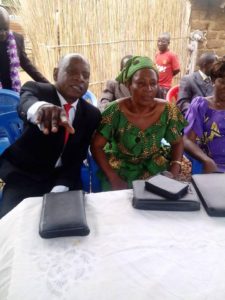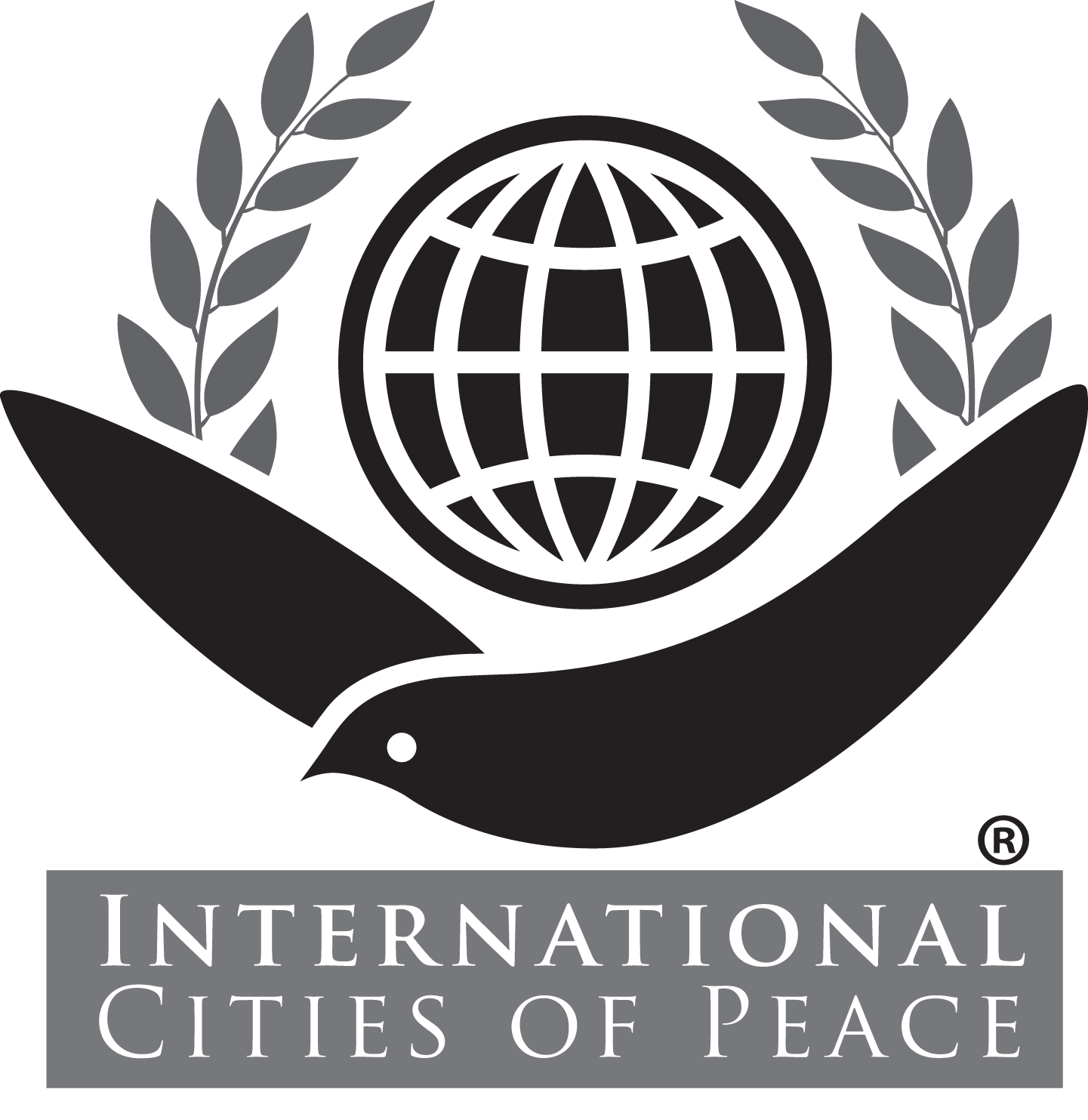Bishop Mabwe Lucien, a Board Member of International Cities of Peace, cuts the ribbon upon breaking ground for a new school in Fizi.
Fizi, Democratic Republic of Congo: City of Peace
We welcome Bishop Mabwe Lucien to the ICP Advisory Council as leader of Fizi, D.R. Congo: City of Peace. Founder of MLECI (in the language of Fizi meaning “a sense of mother who raises her son with love and care), Lucien and his colleagues lay out a practical vision for their community.
Bishop Mabwe Lucien with teachers from the “Glenn D. Paige Nonkilling School” in Fizi
Note: Introduction page with information primarily at the time of joining International Cities of Peace. For updates, please contact the liaison.
LATEST UPDATE FROM BISHOP LUCIEN (DEC., 2019):
To understand the scope of our actions in favor of peace, let’s talk about the Fzi Territory that we have established as a city of peace.
Fizi is a territory of 22,000 km2, located in the South of South Kivu Province in the East of the Democratic Republic of Congo. It is an area with 9 large forest areas where the population lives mainly from agriculture and fishing (in Lake Tanganyika and in large rivers). The minerals (gold, coltan, copper) are mined by craftsmen.
Since for the independence of our country (1960), Fizi has lived with wars. The assassination of the national hero and Prime Minister, Patrice Lumumba, sparked rebellions by his supporters in the country. In 1963, a certain Kabila led a guerrila in the territory of Fizi which extended until 1982 when he was defeated. As early as 1996, with the so-called “Liberation” war of our country, armed groups were formed in Fizi to fight against the invaders and have been active until today, spreading desolation among the populations.
This warlike tradition of Fizi, pushed us to declare Fizi, as a city of peace.
What are our actions?
– We have translated Glenn Paige’s book, ‘Nonkilling Global Political Science’ into Kiswahili under the title “Ujenzi wa jamii isiyokuwa na mauaji: msingi wa elimu mpya ya siasa” (www.nonkilling.org) and print 5,000 copies as we distributed free of charge in seminars on non-violence in 19 cities and villages of Fizi and thanks to these seminars, we were able to create 12 peace centers (nuclei). These nuclei are used to peacefully resolve conflicts between people or ethnic groups in local communities. They advise and lead working sessions on peace and non-violence. For the year 2018, these centers held 28 conversations and debates on non-violence, resolved 9 cases of conflict peacefully.
– We have created a School in Kazimia (Fizi) for children victims of war. It is a free school where non-violence and peace are taught from the kindergaten cycle. 3880 children have already passed through this school. This School is called ‘Glenn Paige Nonkilling School’
– Since 2017, we have organized a football tournament bringing together essentially 4 teams from different villages (either from the East, South, West or North of the Fizi Territory) with the theme ‘Live in peace ’. At the start of the match and at the break, we call for non-violence and play theaters in favor of peace.
– We host a one hour a week program on Radio Baraka on global non-violence.
– Every September 21, we organize meals where we invite people to debate on peace in the Fizi Territory.
GOALS
– Evaluate and monitor the various seminars that we organized peace in Fizi
– Reorganize and reactivate the core of peace Fizi for no other war it can trigger
– Build a monument of peace at Fizi next to Memorial massacres
– Build a School in Fizi where children will learn the price of non-violence and peace from an early age as we have done at Kazimia / Katondje.
– Consolidate all associations involved in peace to form a consortium for a strong and dynamic civil society influence.
Mabwe Lucien wit peace activists in Fizi.
Update on situation: “The elections on November 28, 2011 in DR Congo, instead of calming the people and the city of Fizi, have led to protest and civil disobedience against the authorities. Discontent is widespread. Our job now is to calm youth and encourage them not to enter into armed groups in order to preserve peace. The elections are the only acceptable way to gain power.
“We organize meetings of reconciliation and peace education. Four meetings have been held withe the youth, student and groups of women to influence their husbands and their children not to adhere to violent ideologies.”
Children of the “Glen D. Paige Nonkilling School” in Fizi
The objectives of MLECI:
– Fight against all forms of violence, exclusion and murder
– Working for peace
The organization MLECI means in the region’s language of kiswahili “a nursing mother caring for a child with love.
• In this context, we have translated the book of Glenn Paige “Nonkilling Global Political Science” in Kiswahili (a language common in East Africa) and have taught and distributed at Kigali (Rwanda), Cibitoke, Bujumbura, Makamba and Nyanza-Lac (Burundi), Bibokoboko, Baraka, Some, Mwayenga, Diné, Manga, Karamba, Kazimia, Yungu, Nguma, Talama, Kabumbe, Uvira, Bukavu, Kalehe , Kabare, Kamituga, Fizi, Shabunda, Kalima (DR Congo) and Kigoma (Tanzania).
• We created 12 nuclei (Peace Centre) through the territory of Fizi. These centers are peace groups of people who have the goal to live in peace, to resolve conflicts in the local community by peaceful means and that deals with settlement of any conflict between residents of the community or between groups.
We lead a Council of Elders for the maintenance of peace in Fizi.
• We chair a consortium of 21 organizations of Burundi (5), DR Congo (14, whose organization Peace and Conflict Resolution of Pastor Samuel Muderhwa), Rwanda (1), Tanzania (1). This consortium is affiliate of Center for Global Nonkilling (Honolulu, Hawaii).
• The consortium is currently in the process to research on people who have distinguished themselves in the dark days of the region to save lives, is conducting a study on obstacles to peace in the region.
About Bishop Mabwe Lucien and his work.
Mabwe Lucien, born in Kazimia (Fizi), April 22, 1956. Degree in History and graduated in Theology. Married with 5 children. Former Administrator of the Territory of Fizi (High Authority Policy). Ordained Bishop of the Pentecostal Assemblies of God churches in Congo in 2009.
Mabwe Lucien with his wife.
Founder of the NGO MLECI (word of the language of Fizi with a sense of a mother who raises her son with love and care). MLECI work in the Province of South Kivu (Eastern of the DR of Congo).
History of Democratic Republic of Congo (from Wikipedia):
Located in Central Africa, it is the second largest country in Africa by area and the eleventh largest in the world. With a population of over 71 million,[1] the Democratic Republic of the Congo is the eighteenth most populous nation in the world, and the fourth most populous nation in Africa, as well as the most populous officially Francophone country.
It borders the Central African Republic and South Sudan to the north; Uganda, Rwanda, and Burundi in the east; Zambia and Angola to the south; the Republic of the Congo, the Angolan exclave of Cabinda, and the Atlantic Ocean to the west; and is separated from Tanzania by Lake Tanganyika in the east.[1] The country has access to the ocean through a 40-kilometre (25 mi) stretch of Atlantic coastline at Muanda and the roughly 9 km wide mouth of the Congo River which opens into the Gulf of Guinea.
The Second Congo War, beginning in 1998, devastated the country, involved seven foreign armies and is sometimes referred to as the “African World War”.[4] Despite the signing of peace accords in 2003, fighting continues in the east of the country. In eastern Congo, the prevalence of rape and other sexual violence is described as the worst in the world.[5] The war is the world’s deadliest conflict since World War II, killing 5.4 million people since 1998.[6][7] The vast majority died from malaria, diarrhea, pneumonia and malnutrition.[8]
The Democratic Republic of the Congo was formerly, in chronological order, the Congo Free State, Belgian Congo, Congo-Léopoldville, Congo-Kinshasa, and Zaire (Zaïre in French).[1] These former names are sometimes referred to, as unofficial names, with the exeption of Mobutu’s discredited Zaire, along with various abreviations, such as, Congo, Congo-Kinshasa, DR Congo and DRC. Though it is located in the Central African UN subregion, the nation is also economically and regionally affiliated with Southern Africa as a member of the Southern African Development Community (SADC).
About Fizi (from Wikipedia)
Fizi is one of nine territories (administrative subdivisions – district) comprising the province of South Kivu in eastern DR Congo. Fizi is a vast and poor rural area of about 22 000 km2 for one million inhabitants. The capital of the Territory is also called Fizi (Centre). The city of Fizi is an important center of about 30,000 inhabitants which includes the administrative services of the Territory and some social infrastructure. The city of Fizi is within the territory of Fizi. It remained uninhabited for a long time due to incessant wars: from 1963 to 1968 because of the rebellion led by Désiré Kabila and from 1996 to 2002 because of the liberation war led by Kabila and the rebel pro-Rwandan RCD / Goma.
Note that in the Fizi that former President Kabila led a rebellion against the regime of late President Mobutu Sese Seko from 1963 to1979.
Fizi territory and the city of Fizi remained for a long battered by war. It is in the Fizi Territory where the phenomenon was born Mayi Mayi. The Mayi Mayi fighters are indigenous who use witchcraft and hide in the forest to lead the guerrilla.We led the Fizi Territory as Administrator (First Policy Manager) from 2000 to 2003 during the war.
DO YOU THINK YOUR COMMUNITY CAN BE A CITY OF PEACE? SEND AN EMAIL!
Note: If information or photos used here are copyrighted, please contact us and we will immediately delete the copyrighted material.
